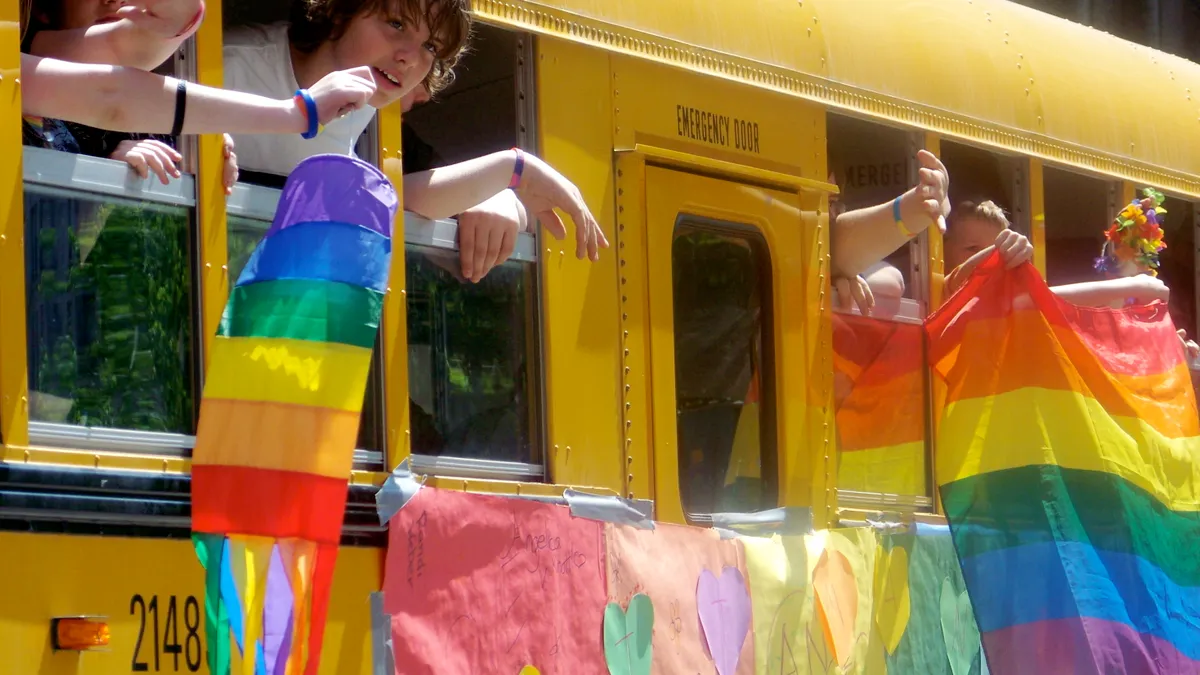Dive Brief:
- Approximately 3% of the nation's high school students are transgender, and another 2.2% say they are questioning their gender, according to the first nationally representative survey data on transgender students released by the Centers for Disease Control and Prevention on Tuesday.
- Slightly over a quarter of transgender students and the same portion of questioning students skipped school in 2023 because they felt unsafe, compared to just 8.5% of cisgender male students. About the same level also said they attempted suicide within the last year, as opposed to 5% of their cisgender male peers.
- Transgender and questioning students also had higher rates of bullying and poor mental health and the lowest rates of school connectedness when compared to their cisgender male and female peers.
Dive Insight:
"Schools are in a unique position to create safe and supportive environments, free from violence and bullying, for all students, including transgender and questioning students," researchers wrote in the CDC report. "Further research is necessary; however, the possibility of school supports as health enhancing for transgender and questioning students is promising."
Generally, school connectedness and activities that create safe and supportive environments are associated with a lesser chance of experiencing violence, poor mental health, and suicidal thoughts and behaviors among high school students. Benefits extend beyond LGBTQ+ students, as activities that are inclusive of LGBTQ+ students are also linked to a lower likelihood of these negative experiences among all students regardless of sexual identity.
The agency suggested creating transgender inclusive environments by providing:
- Student-led LGBTQ+ clubs.
- Professional development to educators and staff on supporting LGBTQ+ students.
- Mental and other health services.
- LGTBQ+ inclusive policies.
The national look at transgender high school student numbers and experiences at school comes at a time when the country is starkly split over supporting LGBTQ+ students generally and transgender students specifically.
Debates over transgender students' access to bathrooms, locker rooms and athletic teams aligning with their gender identities have created a patchwork of district and state policies nationwide that often differ based on local political climates and attitudes.
The Biden administration was expected to release a final federal rule that would have addressed these issues by preventing blanket bans and instead creating frameworks for districts to follow, but the rule's release has been repeatedly delayed.
Curriculum and discussions related to transgender experiences have also been areas of contention, with conservative-leaning states initially curbing the discussions for younger students and then expanding policies to limit discussions for higher grades. Those supporting the restrictions say parents should be able to decide whether, when and how to introduce such topics.
In 2024, almost all LGBTQ+ youth (90%) said their well-being was negatively impacted due to recent politics, according to an annual survey released earlier this year by The Trevor Project, a nonprofit that provides crisis support services for LGTBQ+ people. The prior year, 66% said that hearing about potential local or state laws banning LGTBQ+ issues at school worsened their mental health.













